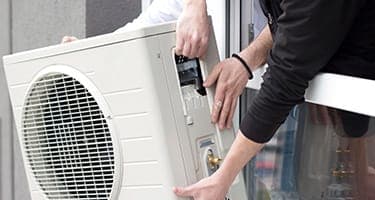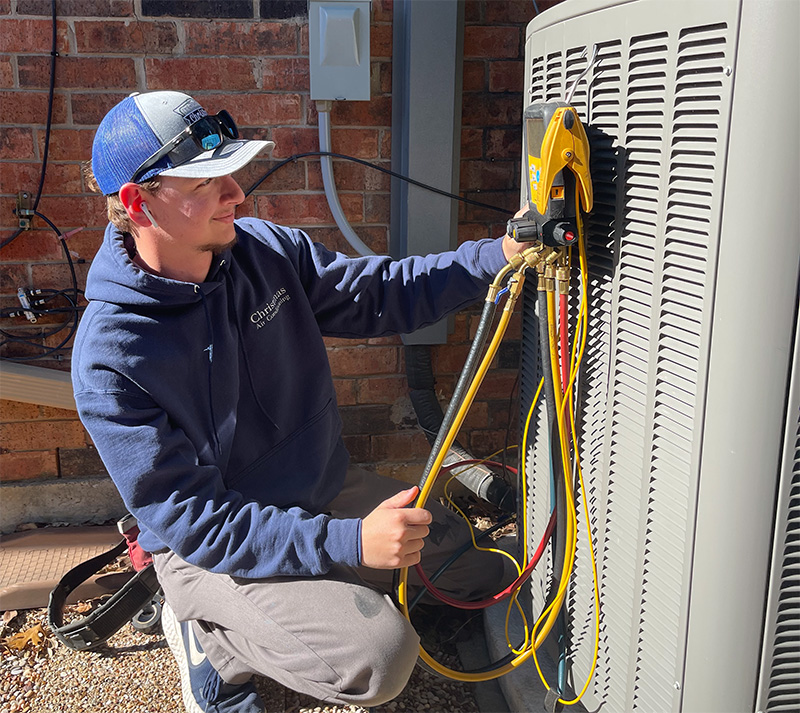All About Air Conditioner Repair Near Me
All About Air Conditioner Repair Near Me
Blog Article
Getting The Air Conditioning Repair Near Me To Work
Air conditioning Repair Near Me: Specialist Cooling System Remediation Guarantees Your Home Stays Comfortable All Year Round
Types of AC Systems
When taking on air conditioning repair, understanding the type of a/c system you're handling can conserve time, money, and irritation. Ever wondered why some systems cool a room much faster than others? Or why particular systems appear to break down more often? Let's peel back the layers.
Central Air Conditioning
Everything about Fix Air Conditioner
Picture a cool breeze flowing through an entire home, whispering convenience into every corner. Central air conditioning systems do precisely that. They use a network of ducts to distribute cooled air, relying on a compressor and condenser outside, coupled with an evaporator coil inside. However when this complex beast fails, identifying the problem can be like finding a needle in a haystack.
Split Systems

Split systems are a popular choice for numerous homes-- part indoor unit, part outdoor compressor. They provide flexibility and performance, but their double nature implies repair can include either component. Have you ever heard an unusual noise outside your home just to find the indoor unit isn't cooling? That's a traditional indication of a split system problem.
What Does Ac Repair Near Me Mean?
Window Units
These compact warriors fight summertime heat by fitting snugly into a window frame. They integrate all components into a single box. Their simpleness often suggests less repair work headaches, however ignoring filters or allowing debris buildup can result in lessened performance or breakdowns.
Ductless Mini-Splits
The 5-Minute Rule for Air Conditioner Repair Near Me
Ductless systems bypass ductwork totally, making them perfect for homes without existing ventilation. They're quiet, effective, and surprisingly resistant. When repair work are needed, technicians must be proficient at click here handling refrigerant lines and electrical connections-- no small feat.
Quick Recommendation Table
| Type | Key Includes | Typical Repair Issues |
|---|---|---|
| Central Air | Ductwork, whole-house cooling | Duct leakages, compressor failure |
| Split System | Indoor & & outside systems | Refrigerant leakages, fan motor issues |
| Window System | All-in-one, easy setup | Unclean filters, electrical faults |
| Ductless Mini-Split | No ducts, zoned cooling | Line leaks, sensor breakdowns |
4 Easy Facts About Air Conditioning Repair Shown
Unwinding one of the most Regular Air Conditioning Issues
Have you ever questioned why your air conditioning system suddenly stops cooling during a sweltering afternoon? One common perpetrator is an unclean or stopped up air filter. This tricky bad guy limits airflow, requiring your system to work overtime, which not just reduces effectiveness however can also cause early breakdowns. Think of attempting to breathe through a headscarf taken in dust-- it's tiring!
Another frequent misstep is refrigerant leakages. These undetectable leaks don't simply decrease cooling power but can likewise damage the compressor, the heart of your air conditioner unit. How typically do you inspect for unusual hissing noises or ice development on the coils? Catching these signs early can save you from costly repair work down the line.
Beyond the Fundamentals: Lesser-Known Issues
Some Known Questions About Air Conditioner Repair Near Me.
Sometimes, the thermostat itself is the nuisance. Miscalibrated or faulty thermostats send mixed signals, triggering the a/c to cycle erratically. Ever knowledgeable your air conditioner turning on and off in quick succession? That's called short biking, a tricky effectiveness drainer that can wear out components much faster than you 'd anticipate.
Electrical problems, such as worn wiring or a malfunctioning capacitor, might prowl underneath the surface area. AC Repair. These often manifest as air conditioning systems failing to begin or suddenly shutting down. An expert eye knows to check these components with accuracy tools, something a casual glimpse will not expose
Expert Tips for Diagnosing Common A/c Problems
Some Known Details About Air Conditioner Repair Near Me
- Inspect and replace air filters routinely-- every 1 to 3 months depending upon usage and environment.
- Listen for unusual sounds like rattling or buzzing that could signify loose parts or electrical faults.
- Examine the outdoor unit for particles or blockages that hinder air flow and trigger getting too hot.
- Search for frost buildup on evaporator coils, a hint towards refrigerant problems or air flow limitations.
- Evaluate the thermostat settings and recalibrate if the temperature level readings feel off.
Quick Reference Table: Manifestation & & Probable Causes

| Symptom | Probable Cause | Expert Pointer |
|---|---|---|
| Warm air blowing | Low refrigerant or filthy coils | Tidy coils and look for leaks immediately |
| Short cycling | Thermostat problems or extra-large unit | Adjust thermostat settings and seek advice from sizing guidelines |
| Unit won't start | Electrical faults or capacitor failure | Test electrical wiring and change capacitors as required |
| Water leak | Obstructed drain line or frozen evaporator | Clear drain lines and examine for coil icing |
DIY AC Maintenance Tips
The Best Strategy To Use For Air Conditioning Repair Near Me
Ever seen your air conditioning system sputtering like an old engine on a hot summer day? Ignoring subtle signs typically indicates more than just a sweaty afternoon-- it's a start to unexpected a/c repair work costs. However what if you could capture those whispers before they develop into wails? Routine DIY maintenance can be your very first line of defense.
Simple Actions to Keep Your Air Conditioner Running Smoothly
The 3-Minute Rule for Ac Repair
- Clean or Replace Filters: A blocked filter resembles trying to breathe through a scarf. Every 1-3 months, inspect and switch out your filters. It improves air flow and performance, avoiding compressor pressure.
- Examine the Condenser Coils: Dust and debris function as invisible blankets smothering your system's cooling power. Carefully brush or vacuum the coils, however prevent severe chemicals that may wear down the metal.
- Examine the Drain Line: When was the last time you peeked at your drain pan? A clogged drain can trigger water leaks and foster mold development. Flushing it with a vinegar option month-to-month keeps the circulation clear.
- Seal and Insulate: Are your ductworks whispering leaks? Sealing gaps with mastic or foil tape boosts effectiveness and cuts down on unequal cooling.
Pro Tips Beyond the Basics
- Procedure your system's voltage to capture subtle electrical wear before it stimulates huge problems.
- Listen for unusual hums or rattles-- these acoustic breadcrumbs often indicate loose parts or failing motors.
- Keep outside systems shaded but make sure at least 2 feet of clearance around them for optimum airflow.
Ask yourself: Are you hearing your air conditioner's quiet SOS or just waiting on it to scream? Taking some time for DIY air conditioning maintenance changes reactive repair work into proactive care, saving sweat, stress, and yes, money.
Air Conditioner Repair Near Me Fundamentals Explained
Why Knowledge in AC Repair Matters
Envision this: your air conditioner unit sputters and groans throughout a scorching afternoon, leaving you sweltering inside your home. Would you rely on an amateur fumbling with delicate elements, or would you seek the reassurance of a professional air conditioning service technician!.?.!? The intricacies of contemporary a/c systems demand accuracy and experience. A slight miscalculation can intensify a minor malfunction into an expensive disaster.
Some Known Details About Air Conditioning Repair Near Me
Unseen Intricacies Behind the Cool Breeze
Lots of underestimate the layers concealed underneath the sleek exterior of an air conditioner unit - Air Conditioner Repair Near Me. From refrigerant leakages that quietly drain pipes effectiveness to defective thermostats that misread temperature levels, these issues require more than a standard toolkit. Professionals possess an eager eye for diagnosing problems that average property owners ignore
Essential Tips for Selecting the Right Professional
Some Known Details About Fix Air Conditioner
- Accreditation and Training: Confirm credentials; a technician trained in the most recent heating and cooling innovations is indispensable.
- Experience with Specific Systems: Not all a/c units are produced equivalent; discover someone acquainted with your design's peculiarities.
- Diagnostic Technique: Proficient service technicians utilize advanced tools-- like electronic leakage detectors and thermal imaging-- to pinpoint surprise faults.
What to Get out of a Pro's Diagnostic Process
| Action | Function | Expert Insight |
|---|---|---|
| Visual Assessment | Recognize obvious wear or damage | Try to find deterioration or unusual noises-- an indicator frequently ignored |
| Pressure Checking | Spot refrigerant leakages | Subtle pressure drops can hint at micro leaks invisible to the naked eye |
| Electrical Checking | Ensure circuit integrity | Loose connections can imitate extreme mechanical failures |
7 Easy Facts About Air Conditioning Repair Shown
Why Do It Yourself Often Falls Short
Appealing as it is to play with your a/c unit, DIY repairs often miss the root cause. For example, topping off refrigerant might momentarily cool your area however overlooks leakages that worsen over time. Professional professionals don't simply spot signs; they pursue the underlying mechanical and electrical faults that sap efficiency.
The 8-Minute Rule for Ac Repair Near Me
Concerns to Ask Before Hiring
- What diagnostic tools do you utilize to recognize problems?
- Can you describe the repair procedure and expected outcomes?
- Are you familiar with the refrigerants suitable with my unit?
- Do you follow security procedures for dealing with electrical parts?